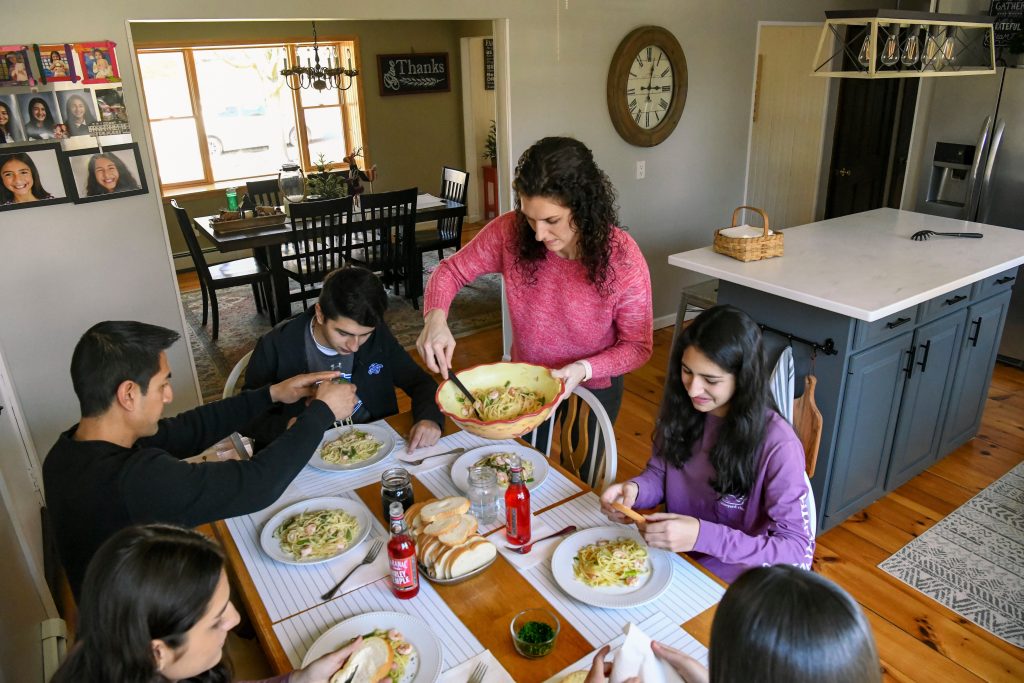In a world where modern technology has brought us closer together in once-unimaginable ways, there is growing evidence that Americans are actually lonelier than ever.
The most isolated are today’s children, adolescents, and young adults growing up in a time of vast social and cultural changes — especially those ushered in by the advent of smartphones and social media — that are only beginning to be understood.
Amid all of this change, young people need constants, and the Church has long advocated for the family as the primary stabilizing force in their lives. That argument is not simply biblical or theological, but supported by the research of social scientists like Brad Wilcox, who today is the director of the National Marriage Project at the University of Virginia and a senior fellow at the Institute for Family Studies (IFS).
Wilcox’s research suggests that in a world marked by individualism and modulating identities, the family remains the best place for kids to understand who they are and what they are made for.
Angelus contributor Elise Ureneck spoke to Wilcox, a practicing Catholic, about what the latest trends and statistics reveal about the state of the American family, and what the Catholic Church can do to help. Their interview has been edited for clarity and length.

ELISE URENECK: If you were asked to present a mini “state of the union” on American families, what would your research reveal?
BRAD WILCOX: There’s good news and bad news to report.
Let’s start with the good news. There’s no question that we’re seeing an uptick in the share of kids who are being raised in intact, married families in the last few years. Two factors are driving that: the divorce rate has been coming down since 1980, and the share of kids being born outside of marriage has stabilized at around 40% since peaking in 2009. While we’re not seeing a dramatic reversal, we can say that about two-thirds of kids in the U.S. are in intact married families today.
The news is darker for adults. I think we're seeing a closing of the American heart unfolding. What I mean is that fewer and fewer adults are opening their hearts, lives, and minds to marriage and children.
We’ve seen marriage rates come down more than 60% since 1970, and the fertility rate reached its lowest point in 2020 during the pandemic at 1.6 (it’s since risen to 1.7). This is new territory.
These numbers tell us that more than a third of today’s young adults will never marry, and about one quarter will never have children.
That’s bad news, given that marriage and family are crucial in securing financial well-being and giving people a sense of purpose. There's a very clear connection between being happy and being a part of a family.
Despite contrasting messages in major media outlets, Americans who are married with kids are doing markedly better on average than their single and childless peers.
URENECK: In choosing to forego families, are Americans setting themselves up for loneliness at the end of life?
WILCOX: That’s correct. I published a piece a while back on Japan, where this has first been manifest. A very large share of young Japanese adults are not married, not dating, and not having sex. As a result, the fertility rate is quite low. And a generation of older Japanese adults are living alone, without being visited for days or weeks on end. I think we’ll see that pattern in America.
URENECK: This seems like it could also have an impact on children, since there will be fewer of them.
WILCOX: Because fertility has been falling since 2009, the number of kids in the U.S. has been declining. That is having impacts on schools in states like California, for instance. We’re going to see an impact when it comes to college enrollment. And then we’ll see an impact on the service sector and the health care sector, since there will be fewer young adults to staff nursing homes, work in restaurants, etc.
At the same time, I’m seeing more evidence that those Americans who do end up getting married and having kids are becoming that much more advantaged in terms of their financial security, sense of meaning in life, and social connection to the larger world. And they’re doing relatively better emotionally as well.
The paradox here is that as the broader society becomes more atomistic and secular, the folks who are married with kids, especially those who attend church, are going be comparatively that much more advantaged because they’re going have many more social ties that are meaningful than their fellow Americans who are living by themselves, spending more time on screens and otherwise disconnected from our core social institutions.

URENECK: What are the major obstacles you see in forming and maintaining healthy families?
WILCOX: People who are living in large metropolitan areas often find the cost of living and real estate to be high, which makes them more hesitant to marry and have children.
When it comes to the culture, there’s a kind of individualism that tells people that they’re more likely to find meaning and happiness in their work, keeping their options open, and having a good time.
We’ve also had shifts in marriage law that have made many people, particularly men, hesitant to get married, because they worry that they’re going to be unwillingly divorced and find themselves in a bad financial predicament.
Technology has been a huge factor. Smartphones discourage in-person socializing, which obviously has predictions for dating and marriage. And they foster an approach to dating that is mediated by technology, which is less conducive to fostering in-person matches.
We’re also seeing many teenage boys and young men floundering. They’re not attending college in the same numbers as women are, and they’re often having difficulty launching. There are millions of young men who are not even working at all. When men are not flourishing, they’re much less attractive as potential husbands.
Lastly, young adults are more secular, and we know that church-going adults are much more likely to value marriage and to get married.
URENECK: You’ve done a lot of research on the importance of fathers in the lives of their children. How do fathers positively impact their sons and daughters?
WILCOX: There are some ways in which dads continue to exercise a relatively traditional role in the lives of married families. Dads are still more likely to be the breadwinner in families, which has ripple effects for housing, schooling, and other kinds of outcomes.
It’s also the case that dads tend to have a more authoritative approach to discipline. They’re more focused on making sure that their kids abide by whatever rules the family is committed to. Their focus on consistency can be valuable.
Parenthetically, moms are often more likely to adjust when disciplining, to soften a kid’s situation. It’s good for kids to be exposed to both kinds of approaches to discipline.
We’re also just now seeing how much of dads’ physical interaction with their kids is important — playing with their kids physically, whether rough and tumble play or throwing the baseball in the backyard. There’s something about this that seems to be linked to a variety of good outcomes for kids.
Dads are also more likely to challenge their kids to embrace life’s opportunities, to overcome challenges and to leave the nest.
Boys with married dads in the household are less likely to be suspended or expelled in school, and they’re more likely to graduate from college. And girls who have engaged and affectionate dads are less likely to be depressed or to have a child out of wedlock.

URENECK: Do you see this across racial and ethnic groups?
WILCOX: The precise relationship can be a little bit different from one group to the next. My colleagues [at IFS] ] and I did a report on fatherhood and marriage looking at differences by race. While there are some modest differences, the basic story is the same for Black and white kids. Kids who are being raised in a house with their father present are much less likely to be poor and more likely to graduate from college. They’re less likely to wind up in jail or prison.
Dads matter for Black and white kids, for rich and poor kids. There are some differences in terms of how these things are manifested, but for a lot of the outcomes that concern us, having married parents and your own father on scene are important for kids and adolescents and young adults.
URENECK: We’ve seen many reports of a deepening mental health crisis among young people, both prior to the COVID pandemic and certainly in its wake. What might be causing this and what do you recommend to help stem the tide?
WILCOX: We have a new report out at IFS with Jean Twenge, one of the leading scholars on technology and teens. What we find is that things like depression, loneliness, or insufficient sleep — which is a major predictor of kids’ psychological distress — are more common in non-intact homes.
There’s basically a technological story and family structure story. The kids who are doing the best are kids in intact families with relatively low-tech consumption. The kids who are doing the worst are kids who are from non-intact families, without their married parents in the household and spending more than eight hours a day on screens.
Technology has been one factor in helping to explain how we’ve seen general increases in anxiety, depression, and suicide ideation playing out for teens and young adults since the rise of smartphones and screen culture in the late 2010s. It’s not the only factor, but it’s certainly a major factor.
URENECK: The Catholic Church in the U.S. is seeing a decline in sacramental marriages. What’s the elevator pitch that clergy and laity should be making for marriage?
WILCOX: I talk about the importance of four things: suffering, security, solidarity, and significance.
One of the problems with our time is that we don’t suffer enough. If you’re just kind of constantly on a screen pushing a dopamine hit or doing things that give you immediate pleasure, you wind up miserable. We can see this with food. If we’re constantly eating, we’re not going to feel great in the long term.
Someone with a spouse or kids suffers. By that I mean you might have to get up in the middle of the night with a sick child or comfort your wife who lost her mother. There’s definitely conflict in marriage, times when you’re upset or angry with your spouse. But the literature indicates that suffering up to a certain point makes us emotionally stronger and our life more meaningful.
Second, married folks are much more secure than their unmarried and childless peers. They will have markedly higher incomes and more assets as they head into retirement. But there’s a different kind of security they have heading into midlife and late life when it comes to things like health and hospitalizations, particularly married men. We’ve seen this in studies on cancer. Cancer patients do a lot better when they’ve got a spouse who’s advocating for them, helping them with their meds, and giving them encouragement.
Solidarity is the third piece. We are social animals, and being a part of a mini-community with a spouse and children ends up being really important, something we especially discovered during the COVID lockdowns. In a world that’s increasingly atomistic, where people are alone a lot, having a spouse and kids is good not just for the household, but good because families bring you into contact with other people.
The final “s” is about living a life of significance. I was talking to a man for a book I’m working on who lives in the outer suburbs of Washington, D.C. He’s got a six figure salary, his own house, a pretty high-powered job, and a college degree and a master’s degree. By the standards of the culture, he should be doing fine. But he’s not a happy man, and he’s keenly aware of the fact that there’s no one there for him.
He’s not living for anyone else. His evenings and weekends are pretty empty. He’s suffering from a tremendous sense of what’s called “anomie.” By contrast, while it can be tough to be a spouse and mother or father, your life is pretty full with things to do and people to see and care for. There’s something about caring for someone and being cared for that’s important for our sense of significance.
I think that the happiness gap is going to get bigger, because our country is moving in a more atomistic direction: People who are not married and not having kids are becoming much more disconnected from the core institutions that give our lives a sense of meaning, purpose, and happiness.

URENECK: What role does religious practice have in relation to happiness or other outcomes?
WILCOX: There’s a decent amount of research saying kids who are more religious are more likely to be honest, less likely to be using alcohol and drugs, and less likely to engage in criminal activity. They’re more likely to do better in school, especially if they’re kind of coming from more working-class or lower-income backgrounds. It seems like religion is particularly important in lending some social stability to kids who are otherwise disadvantaged. Kids who are religious tend to do better than their peers who are not.
But it’s also good for adults. When you look at trends from Gallup related to emotional well-being and across the pandemic, you see that the only group of adults who did not see a dramatic decline in their emotional well-being were Americans who regularly went to church in person when things opened up in the summer of 2020.
Speaking as a social scientist, it’s clear that it’s important that we invest in our churches, schools, families, civic institutions, and communities. Even though that can be demanding and people can be challenged in all of those contexts, the net benefit for most people is that they’re more likely to be flourishing in those social connections.
URENECK: Do you see signs of hope?
WILCOX: I think the great paradox of our day is that Americans who are married with kids seem to be doing not just better than their peers who are single and childless, but relatively better on a number of outcomes. I’ve seen a bit of a gap opening up in life satisfaction between those two groups in what’s called the American Family Survey.
Kids who are coming from intact, married families are not just doing better than kids from non-intact families when it comes to things like school suspensions and college graduations, but they’re actually doing relatively better now than 20 or 30 years ago. So this is preliminary, but this suggests to me that marriage and family matter more today than they used to for adults and kids.
I think the challenge facing the Church and other institutions that are more family-friendly is how to communicate this to the broader public. We all know that there are plenty of folks in the media, the academy, and in pop culture who are trying to tell us that marriage and parenthood will make you miserable. But in fact, for the average person, it’s the opposite.
The challenge is how to share the good news. The vocation to marriage and family life is difficult. It’s hard. But overall it’s one where a lot of people find meaning, direction, and happiness.

